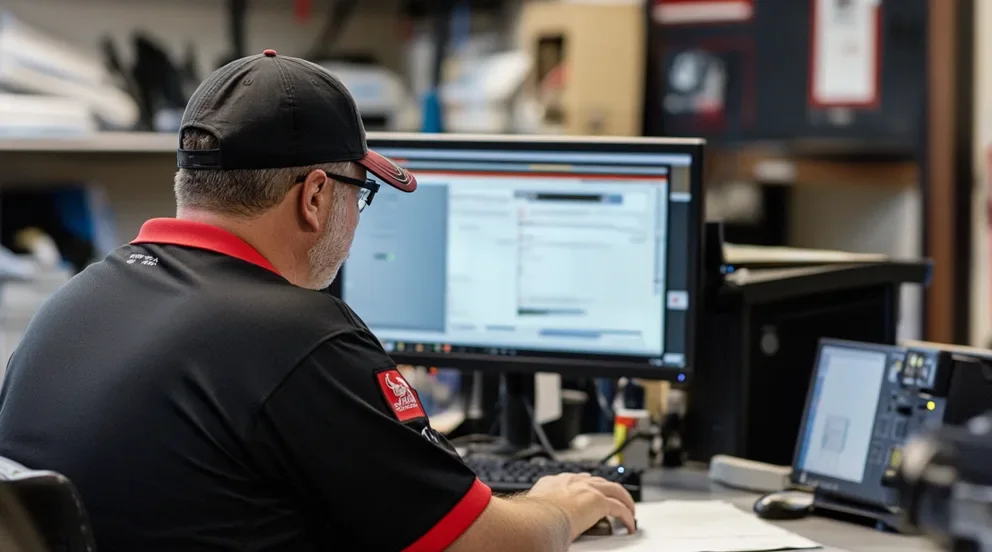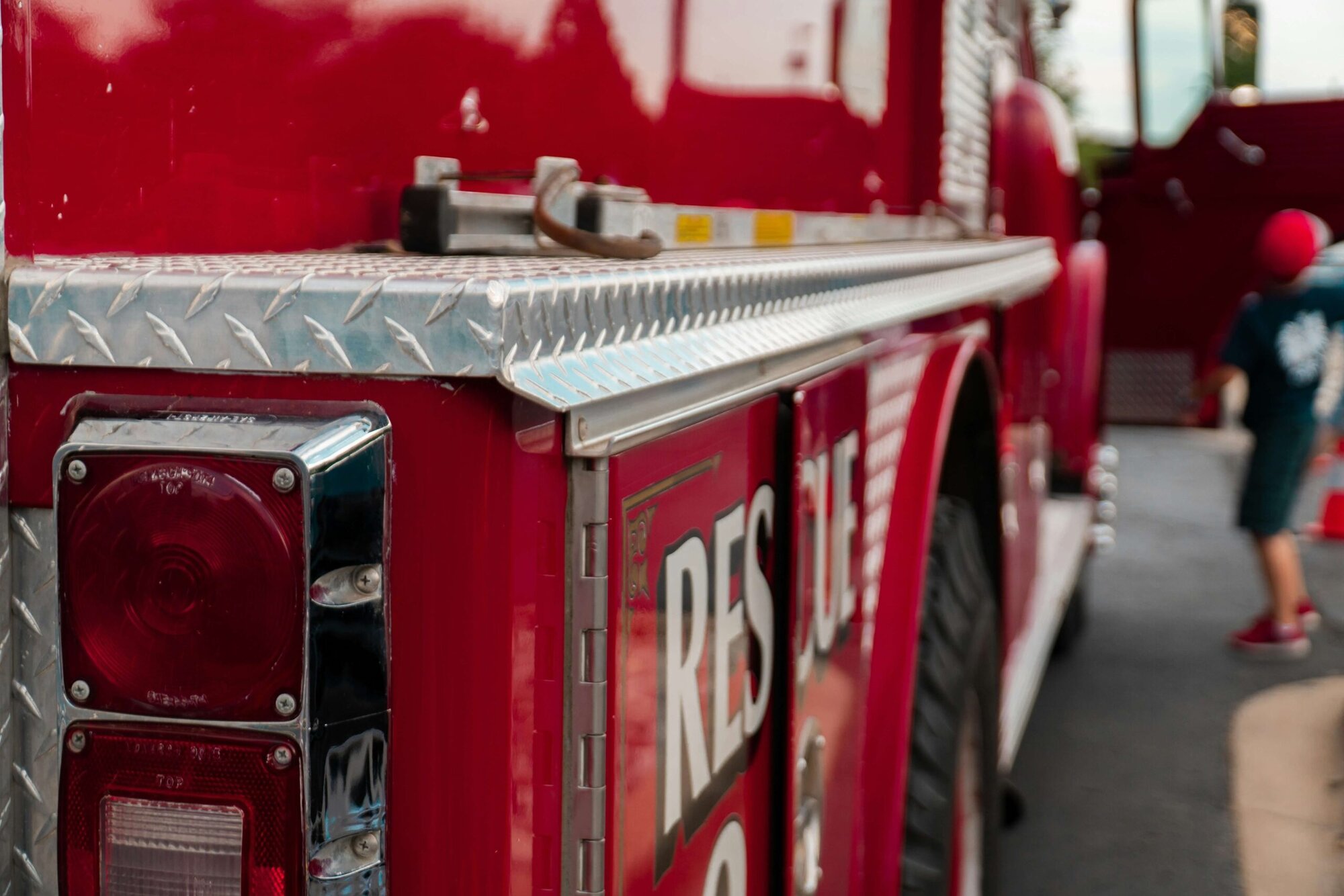Managing a fire safety company means navigating tight schedules, detailed compliance requirements, and high-stakes service calls. Between annual inspections, emergency dispatches, and maintenance contracts, it’s easy for customer data and job history to get buried—or lost altogether.
That’s where protection software for fire safety contractors comes into play. A CRM tailored to this industry helps track inspection logs, customer interactions, service agreements, and follow-ups in one centralized system. It keeps your field team aligned with the office, ensures nothing slips through the cracks, and frees up time to focus on what really matters—protecting lives and property.
Here’s what we’ll cover:
- How to choose a CRM system for fire service work
- 6 features fire safety companies need in a CRM software
- 5 best CRM fire service & safety software & tools
- 7 ways a fire CRM software helps fire safety companies run better
- 4 important FAQs on fire CRM systems & tools
In a trade where every job could mean the difference between safety and risk, your tools need to pull their weight. Up next, we’ll break down how to choose a CRM that fits the way fire protection crews actually work—one that supports inspections, dispatch, and compliance from the ground up.
How to choose a CRM system for fire service work
Some CRM tools look good on paper—until you actually try using them in the field. For fire safety companies, picking the right system isn’t about bells and whistles. It’s about finding an automated setup for fire systems that actually supports how your team works: logging inspections, dispatching crews, managing service contracts, and keeping up with code compliance. The wrong CRM creates more work. The right one helps your crew stay sharp and your jobs stay on track.
Here’s what to consider when evaluating a CRM for fire safety companies:
- Fit for your workflow - Does the CRM align with how your team handles inspections, service visits, and contract schedules? Can it support the fast pace of your day-to-day without creating extra admin work? Does it reflect the type of jobs and clients your business actually serves?
- Ease of use - Will your techs and office staff be able to use it without a steep learning curve? Can job details be accessed or updated in just a few clicks? Does it eliminate the need for constant training or backtracking?
- Visibility and control - Can you see the status of every job, technician, and service contract at a glance? Does it give you real-time updates without needing constant check-ins? Will it help you stay ahead of inspection due dates and customer needs?
- Scalability and adaptability - Can the system grow with your team and handle more jobs as you expand? Is it flexible enough to adapt to changing regulations or business goals? Does it offer room to integrate with other tools down the line?
- Features - Does the CRM come with tools that actually support fire safety work—not just general service calls? Can it help your business manage compliance, customer history, and job documentation effectively? What functions are built-in, and which ones require add-ons or third-party software?
Choosing a CRM fire service platform comes down to how well it fits the realities of your day-to-day work. Your team is out handling inspections, managing service calls, and staying compliant with tight regulations—there’s no room for a system that creates more headaches. In the next section, we’ll look at the features that support those exact needs and keep fire safety operations running smoothly.
6 features fire safety companies need in a CRM software
In fire safety operations, you’re not just managing jobs—you’re managing people, contracts, and accountability. A strong CRM should serve as the central system that captures and organizes customer interactions across inspections, service agreements, quotes, and communication history. These six features are directly tied to what makes a CRM effective for fire protection contractors working in the field. Here’s what to look for:
1. Fire safety service history and customer record tracking
Every inspection, every repair, and every phone call matters in fire protection—especially when it comes to long-term service agreements. A fire safety CRM should store a full history of customer interactions, job outcomes, deficiencies, and asset notes so your techs never go in blind. This kind of traceability also helps with compliance and follow-ups down the line. Let’s say a tech is sent out to a facility that’s had repeat issues with faulty valves. By accessing the full service agreement tracking system, they can review the last inspection, identify what’s already been flagged, and walk in ready to solve the issue—not start from scratch.
2. Quoting and proposals for fire protection work
Inspections often uncover problems that lead to new work—repairs, upgrades, replacements. Your CRM should help techs or office staff generate fast, accurate quotes based on customer history and available parts. This eliminates back-and-forth and helps close the loop before the tech even leaves the site. For example, a technician spots a corroded riser during a routine sprinkler check. With field service quoting software, they can create a proposal tied directly to that service visit and send it out same-day—no extra tools needed.
For more complex system estimates—like fire alarm replacements or multi-device installs—fire alarm estimating software gives teams the precision needed to quote quickly and confidently.
3. Recurring fire service contract tracking
Managing multiple clients with recurring inspections is hard to do manually. A fire safety CRM should allow you to build out service agreements, link them to job schedules, and set reminders for recurring visits. That way, no inspection falls through the cracks—and your clients get the reliability they expect. Take a national retail chain that needs quarterly extinguisher checks at 30+ locations. With contract management tools, your team can automate visit reminders and ensure every job matches the contract terms without having to build schedules from scratch.
4. Customer communication built for fire protection teams
Field teams and office staff need access to the same customer conversations to avoid crossed wires. A CRM should log emails, calls, and service updates and tie them directly to each customer record—so your whole team is speaking from the same page. Say a property manager calls in asking for a timeline update. Instead of scrambling, your admin pulls up the full message history inside the CRM and delivers a quick, accurate response—no guessing or miscommunication.
5. Inspection and deficiency records connected to accounts
Fire safety work generates reports, checklists, and corrective action logs—documents that need to stay tied to the customer record for compliance and follow-up work. A solid CRM makes it easy to upload and retrieve these from anywhere, with clear job-to-customer associations. Let’s say a client needs to see all fire alarm deficiencies flagged during last year’s annual. With reporting tools, your team can instantly pull a complete, timestamped list tied to that location and account.
6. CRM pipeline tracking for fire safety sales
Fire safety teams also need to manage growth. Whether it's incoming service inquiries or quoting full system installs, a CRM should give visibility into every sales opportunity. This helps teams track follow-ups, forecast work volume, and prioritize leads effectively. If your estimator walks into a new facility and starts the quoting process, they can log it in the CRM, set reminders, and monitor where that lead sits in the pipeline management system. That way, no opportunity gets left behind.
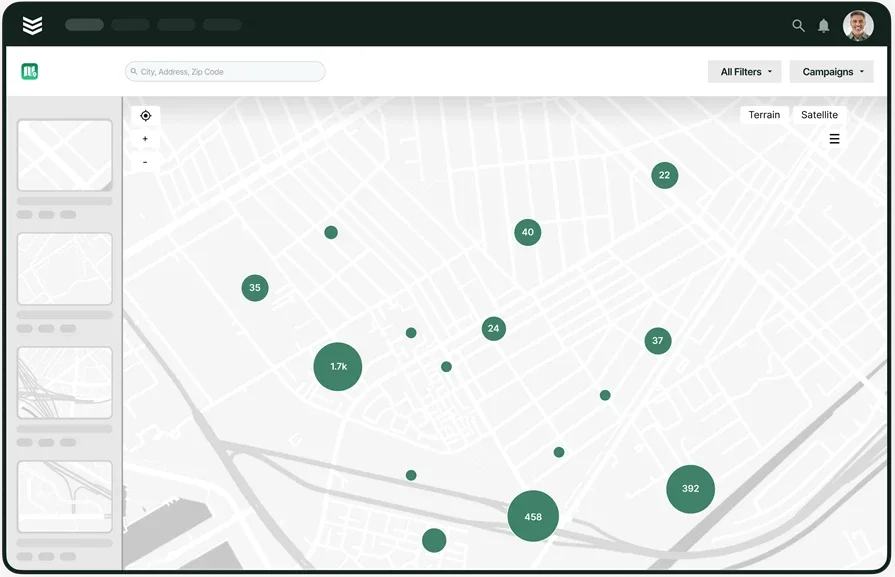
Explore our CRM product
Manage projects from the very first call through to closeout—without hiccups.
Other useful features for fire safety software that go beyond CRM
A strong CRM helps fire safety companies manage customers—but that’s only half the battle. Field teams need tools that support real-time work in the field, especially when you're coordinating inspections across multiple sites or handling emergencies under tight deadlines. These tools aren’t traditional CRM functions, but they’re critical to running a smooth operation on the fire protection side of the job. Here are the features that take fire safety fieldwork to the next level:
- Real-time scheduling and dispatch – Staying on top of inspection windows and service calls means being able to shift jobs around in seconds. With dispatch software, your team can move appointments, view technician status, and reroute calls—all without losing track of priorities.
- Fleet and asset tracking – It’s not just about where your team is—it’s about what they’re carrying. Fleet tracking tools give you a real-time view of vehicles, equipment, and technician locations so you can respond faster and avoid sending techs out without the tools they need.
- Mobile access for technicians – Most fire jobs don’t happen near a computer. Technician mobile apps give your crew full access to schedules, service history, inspection checklists, and signature capture—all from the field, even if they’re in a basement or on a ladder. For inspection-heavy workflows, especially fire alarm system checks, tools like a fire alarm inspection app help streamline documentation, reduce errors, and speed up compliance reporting.
- Time tracking and crew management – Whether your team is handling one-off jobs or ongoing contracts, tracking hours accurately is critical. Time tracking features help techs log time in the field and ensure payroll and billing align with actual hours worked.
- Invoicing and payments – Getting paid shouldn’t require chasing paperwork. With invoicing and payment tools, you can generate and send invoices as soon as a job is done, log payment status, and keep everything flowing without holding up your books.
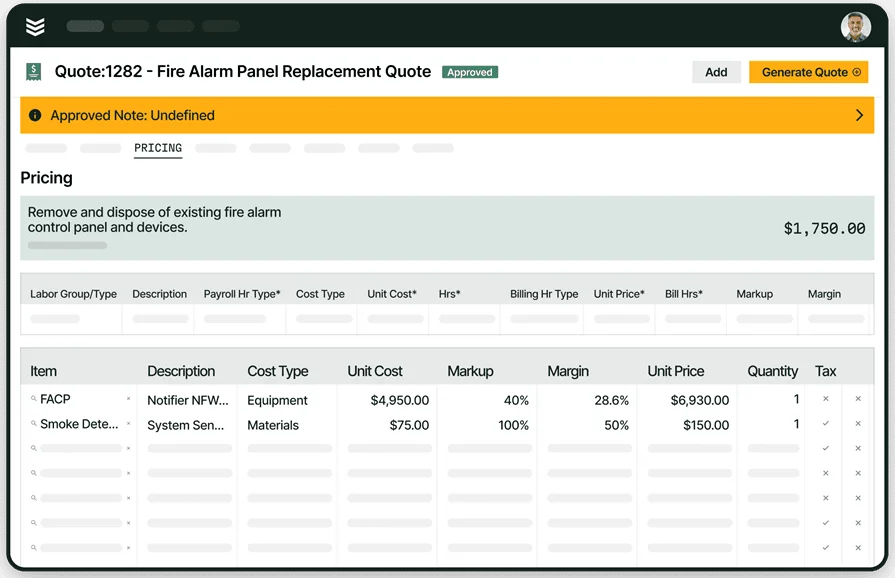
Built for commercial teams
BuildOps has all these features in our tools, and more.
These tools aren’t add-ons—they’re essentials for staying competitive in fire protection. When built into your fire safety CRM, they eliminate the gaps between your team’s work in the field and your operations at the office.
5 best CRM fire service & safety software & tools
Choosing a CRM for fire safety companies means looking beyond basic contact lists. You need tools that help teams stay on top of inspections, respond to emergencies quickly, and manage compliance documentation without missing a beat. The best fire protection management platforms tie everything together—dispatching, job tracking, customer history, and field communication—so your crews can focus on the work, not the paperwork.
1. Best for commercial: BuildOps
Fire protection contractors working on commercial sites need more than a place to log customer details. They need a system that connects office staff, field technicians, and compliance reporting in one seamless flow. BuildOps is designed specifically for commercial service contractors, combining CRM with job management, dispatch, quoting, invoicing, and reporting—making it a strong fit for fast-paced fire safety operations.
With BuildOps, fire safety companies can manage recurring inspections, track service contracts across multiple properties, generate job reports instantly, and keep AHJ compliance records organized. No more juggling apps or chasing paper trails—everything is accessible in real time from one platform.
How pricing works: BuildOps offers weekly live demos and provides custom pricing tailored to your team size, workflows, and field volume.
Features beyond CRM:
- Real-time job scheduling and dispatch with drag-and-drop functionality
- Field app for inspection checklists, customer signatures, and report uploads
- Built-in tools for quoting, tracking proposals, and managing recurring contracts
What sets it apart for commercial fire safety: Unlike generic CRMs, BuildOps is geared for fire safety businesses managing multiple jobs, locations, and long-term service agreements. It streamlines everything from the first inspection to the final invoice—so your team spends less time on admin, and more time protecting properties.
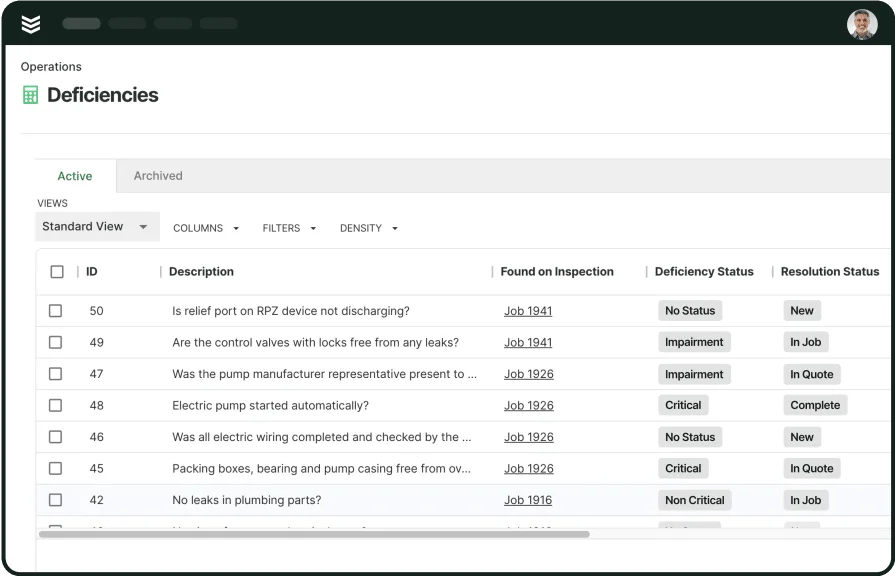
See BuildOps in action
We help fire safety pros identify and track deficiencies with fewer delays.
2. firepro365: Best for companies focused primarily on inspection reporting
Image Source: firepro365
firepro365 is a CRM solution developed for fire protection contractors, offering tools for inspection tracking, scheduling, and customer data management. Built on Microsoft Dynamics 365, it ties into a familiar ecosystem for companies already using Microsoft tools. That said, firepro365 is more focused on inspection workflows and lacks deeper support for integrated dispatch, quoting, or field-first job execution.
How pricing works: firepro365 offers customized pricing based on your company’s specific needs and size.
Features beyond CRM:
- Inspection reporting and automation
- Mobile app with barcoding for field technicians
- Integration with Microsoft Office 365 tools
What sets it apart for commercial fire safety: firepro365 stands out for companies heavily focused on documentation and inspection data. But teams that need tighter coordination across field operations, service quoting, and job tracking may find its scope too limited.
3. ServiceTrade: Best for inspection-heavy service contractors
Image Source: ServiceTrade
ServiceTrade is purpose-built for fire protection companies prioritizing inspection compliance and recurring service schedules. It offers digital inspection forms, automated deficiency tracking, and a customer portal for streamlined communication. However, it leans heavily toward inspection workflows and may not offer the broader field service support needed for large-scale, multi-phase projects.
How pricing works: ServiceTrade offers subscription-based pricing, with plans based on team size and business needs.
Features beyond CRM:
- Digital inspection forms with barcode scanning
- Automated deficiency reporting and quoting
- Customer portal for accessing reports and invoices
What sets it apart for commercial fire safety: ServiceTrade works well for teams that primarily handle recurring inspections and compliance. For companies needing a more complete platform that connects dispatching, quoting, and ongoing job management, it may feel too limited.
4. Smart Service: Best for fire protection businesses tied to QuickBooks
Image Source: Smart Service
Smart Service is a field service platform that integrates directly with QuickBooks, making it suitable for contractors who prioritize accounting-first workflows. It handles job scheduling, dispatch, and invoicing through a QuickBooks-connected backend. That said, businesses not centered around QuickBooks—or those needing deeper tools for compliance, recurring contracts, or field reporting—may find it too narrow in scope.
How pricing works: Smart Service provides customized pricing based on company size and business requirements.
Features beyond CRM:
- Integration with QuickBooks for seamless accounting
- Mobile app for field technicians
- Dynamic routing for efficient scheduling
What sets it apart for commercial fire safety: Smart Service fits well for companies prioritizing finance integration above all. But when the job requires complex scheduling, inspection visibility, or long-term customer tracking, it may not hold up against broader platforms.
5. BigChange: Best for fire safety teams seeking all-in-one light operations
Image Source: BigChange
BigChange is an all-in-one job management platform used by general field service industries, including fire and security. It offers scheduling, job tracking, mobile apps, and compliance tools. But its one-size-fits-all approach may include more features than fire safety teams need—while lacking the specialty tools contractors rely on for quoting, service agreements, or inspection-specific workflows.
How pricing works: BigChange offers tailored pricing based on your business's size and requirements.
Features beyond CRM:
- Mobile app for step-by-step job management
- Real-time tracking and efficient scheduling
- Digital risk assessments and compliance management
What sets it apart for commercial fire safety: BigChange may suit teams looking for a simplified all-in-one system. However, for contractors managing recurring inspections, detailed service logs, and large-scale quoting—more specialized solutions may offer better fit and focus.

Easily compare tools at a glance
Get an easy-to-use scoresheet that lets you compare fire safety solutions.
7 ways a fire CRM software helps fire safety companies run better
Fire protection work doesn’t pause. Your team is out doing alarm verifications, backflow inspections, and last-minute service calls—all while trying to meet compliance standards and keep up with paperwork. That’s where a strong CRM for fire safety companies helps tighten up operations. It’s not just about organization—it’s about speed, accountability, and fewer headaches at every level. Here’s how it actually makes your day-to-day easier:
1. Fewer missed inspections and overdue service visits
Recurring inspection schedules can get buried fast—especially when juggling multiple properties, AHJ deadlines, and one-off emergency calls. A fire safety CRM helps your team track when service is due, where, and for what system.
Expert Tip
One of the most effective ways to ensure your fire safety CRM works well for all aspects of field service is checking if your tool integrates with other tools specifically built for fire safety teams.
These tools should be connected to the compliance side of fire inspections, automating those processes. BuildOps for example integrates with InspectPoint to create a connected workflow for fire safety contractors.
2. Faster dispatch decisions in urgent situations
When a smoke detector panel fails or a client gets flagged by the fire marshal, time matters. A CRM that ties into dispatching lets your team find the closest tech, reassign jobs quickly, and provide real-time updates from the field. This responsiveness is one of the top reasons fire protection contractors look to systems like the 6 best CRM dispatch software—where jobs get reassigned and logged instantly, without the back-and-forth.
3. Better accountability on service history
Your crews need to know what was done, by who, and when—especially if you’re returning to a site flagged for reinspection. A CRM provides one shared record that makes every inspection, deficiency, and fix traceable. This means no more digging through old PDFs or calling the last tech who worked the job. It keeps your field teams moving and your documentation airtight—something this field service CRM software outlines clearly.
4. Easier customer follow-up and communication
It’s not just about getting the job done—it’s about keeping the client in the loop. With automated messaging and shared service histories, CRMs help your team send inspection results, invoices, and follow-up notes without delays. Instead of phone tag or late emails, everything’s sent on time, and the customer always knows where things stand.
5. Cleaner handoffs between techs and admins
When your techs finish a job, your office needs the details fast. A good CRM helps bridge that handoff—letting technicians upload photos, inspection forms, and notes on-site so nothing gets lost in translation. That smoother flow keeps jobs moving and billing accurate. This is especially critical for smaller teams, as shown in this CRM software for small business contractors, where every tech-hour and detail counts.
6. More accurate quoting and deficiency tracking
Inspection jobs often reveal new problems—damaged fire doors, expired extinguishers, or system faults that weren’t on the original scope. A CRM helps turn those findings into quotes fast, using templates and past job history to build accurate proposals. It also ensures follow-up work isn’t forgotten, which improves safety and keeps service revenue flowing.
7. Stronger team coordination on large accounts
If you’re managing service contracts across hospitals, schools, or high-rise buildings, your team can’t afford to work in silos. A fire CRM gives both field and office staff visibility into every property, inspection, and communication thread. That clarity helps coordinate follow-ups, plan recurring work, and prevent crossed wires on job expectations—all without having to second-guess what’s already been done.
4 important FAQs on fire CRM systems & tools
Running a fire protection business means handling a high volume of jobs with strict timelines, regulatory pressure, and recurring contracts. A solid CRM system brings order to the chaos—but only if it’s the right one and used effectively. Here are the most common questions fire safety contractors ask before making the switch.
1. What is fire safety CRM software?
Fire safety CRM software helps contractors manage customer records, inspection cycles, service agreements, and job histories in one system. It’s designed to keep field crews, dispatchers, and office staff working in sync—making sure every job is scheduled, tracked, and completed with full visibility.
2. How does fire safety CRM help with industry compliance?
In fire protection, compliance isn’t optional. You’re expected to provide documentation for every inspection, track service histories, and address deficiencies fast. A CRM helps log this work in real time—generating detailed records and reports that align with AHJ standards and regulatory requirements. That audit trail matters when deadlines or fines are on the line.
3. Can a CRM really save time for my fire service team?
Yes—and not just in the office. Techs can log jobs, upload inspection results, and send invoices right from the field. Office teams don’t need to re-enter data or track down missing paperwork. This speeds up dispatching, billing, follow-ups, and quoting. In fire safety, where documentation and response times are critical, a CRM removes the bottlenecks.
4. What are best practices for using CRM software in a fire protection business?
Just having a CRM isn’t enough—it needs to be set up, used, and maintained with purpose. Fire protection work comes with its own workflows and challenges, so getting the most out of your CRM means building processes that align with your team’s actual day-to-day. Here are 8 best practices to follow:
- Set up service categories for different systems (sprinklers, alarms, extinguishers, etc.)
- Automate inspection reminders for recurring jobs and compliance dates
- Use custom fields to capture AHJ-specific requirements or certifications
- Give techs mobile access to service histories and job checklists
- Train office staff to monitor job progress and close out invoices quickly
- Use tagging or filters to prioritize urgent calls and open deficiencies
- Regularly review reports for trends in failed inspections or delayed jobs
- Back up your data and update the system regularly with new job types and customer details
These practices make sure your CRM isn’t simply a database—it’s a tool that keeps your entire fire protection business tight, responsive, and compliant.
Running a fire safety company means staying sharp—on the job, with the paperwork, and across every inspection cycle. When you're balancing service agreements, last-minute calls, and strict regulatory standards, having the right tools in place isn’t a luxury—it’s how you keep things moving without anything slipping through the cracks. A CRM tailored to fire protection work helps you keep teams aligned, records accurate, and customers taken care of.
The best platforms do more than track contacts. They support dispatching, job histories, mobile updates, quoting, and recurring service management—all in one place. That’s where BuildOps makes an impact. For commercial fire safety contractors handling complex workflows and multiple job types, it brings everything together into a single, field-ready system that’s built for how your crew actually works.
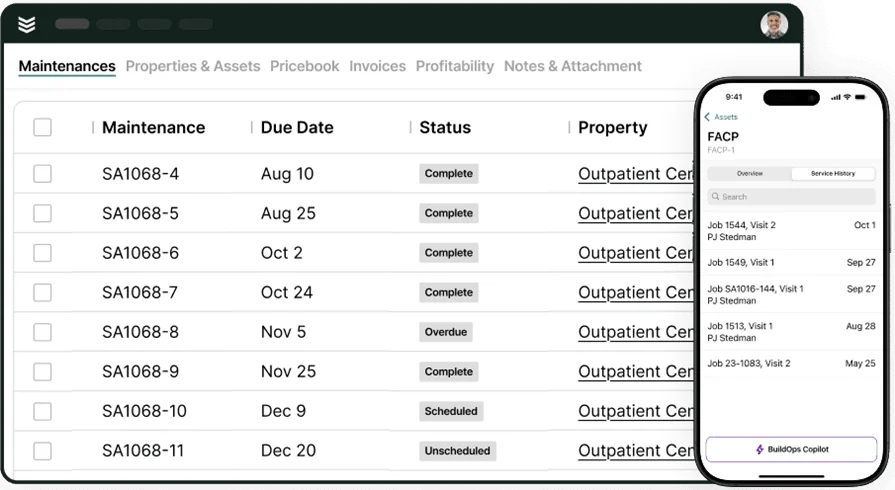
Curious to see it in action?
See how BuildOps helps fire safety crews manage projects effectively.
